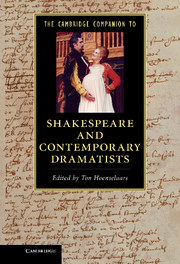Book contents
- Frontmatter
- Contents
- Illustrations
- Contributors
- Preface
- Chronology of the life and work of Shakespeare and contemporary dramatists
- 1 John Lyly and the University Wits
- 2 Thomas Kyd and the Elizabethan blockbuster
- 3 ‘The words of Mercury’
- 4 The dyer’s hand
- 5 Urbane John Marston
- 6 Thomas Dekker and the emergence of city comedy
- 7 Shakespeare
- 8 Thomas Heywood
- 9 George Chapman’s learned drama
- 10 Francis Beaumont and John Fletcher’s tragicomedy as musical melodrama
- 11 Thomas Middleton and the early modern theatre
- 12 John Webster
- 13 John Ford
- 14 Philip Massinger
- 15 Richard Brome and the idea of a Caroline theatre
- 16 Troublesome histories
- Select bibliography
- Index
- References
14 - Philip Massinger
Drama, reputation and the dynamics of social history
Published online by Cambridge University Press: 05 December 2012
- Frontmatter
- Contents
- Illustrations
- Contributors
- Preface
- Chronology of the life and work of Shakespeare and contemporary dramatists
- 1 John Lyly and the University Wits
- 2 Thomas Kyd and the Elizabethan blockbuster
- 3 ‘The words of Mercury’
- 4 The dyer’s hand
- 5 Urbane John Marston
- 6 Thomas Dekker and the emergence of city comedy
- 7 Shakespeare
- 8 Thomas Heywood
- 9 George Chapman’s learned drama
- 10 Francis Beaumont and John Fletcher’s tragicomedy as musical melodrama
- 11 Thomas Middleton and the early modern theatre
- 12 John Webster
- 13 John Ford
- 14 Philip Massinger
- 15 Richard Brome and the idea of a Caroline theatre
- 16 Troublesome histories
- Select bibliography
- Index
- References
Summary
Philip Massinger (1583–1640) has long been a challenging subject for criticism. For many, he was definitively put to rest by T. S. Eliot’s notorious 1920 essay, which in no uncertain terms declared his work ‘inferior’ and accused him of having ‘initiated’ the historical split between emotion and intellect that Eliot was famously to dub ‘dissociation of sensibility’. Eliot’s description of a dramatist swayed by conventions while lacking emotions or imagination, whose verse suffered from ‘cerebral anaemia’ and whose dramatic skills revealed a lack of awareness of people, still resonates nearly a century later as a disincentive to encounter Massinger (especially on the page). However, this indictment was only one late but influential example of the alternating reactions that have accompanied Massinger’s work since his own time, revealing not only the instability of his reputation, but also his remarkable capacity to remain on the critical record.
The sheer facts of Massinger’s career show that he was unquestionably successful in his lifetime. He began, in the 1610s, by writing collaborative work (with John Fletcher and others), but went on to write independently and indeed became chief playwright for the King’s Men after Fletcher’s death in 1625. He is believed to have authored or co-authored over fifty plays, of which thirty-three have survived (fifteen of single authorship). He enjoyed significant stage triumphs, and may in fact have been ‘the most commercially successful dramatist of his day’. However, the reactions of his contemporaries set the tone for both the admiration and the opprobrium that he would later receive. Thomas Jay, in commendatory verses to The Roman Actor (1629; first performed 1626), praised Massinger’s elevated diction or ‘loftie straine’, and the performative qualities of his dramatic language, which ‘can / Giue Swords, and legions to domitian’; while the rival playwright William Davenant (in the context of theatrical quarrels of the 1630s) had no qualms in damning the supposedly ‘flat / dull dialogues’ of ‘this Mechanicke play-wright’ who offered ‘no Character entire’.
- Type
- Chapter
- Information
- Publisher: Cambridge University PressPrint publication year: 2012

